- What Are Ketone Bodies (Ketones)?
- Types of Ketone Bodies
- Top 7 Ketone Supplements
- Exogenous Ketones vs. Keto Shakes
- Health Benefits of Exogenous Ketone Supplements
- Drawbacks of Exogenous Ketone Supplements
- Ketone Supplements Side Effects
- How I Use Exogenous Ketones
- Frequently Asked Questions
- The Best Ketone Supplements: Final Thoughts
Ketone supplements — also known as exogenous ketones — have become a popular product within the keto community. Manufacturers promise that these dietary supplements can improve athletic performance, lessen the symptoms of the keto flu, burn fat, reduce food cravings, boost mental clarity and increase energy levels.
But is any of that true? In this article, I’ll explain everything you need to know about ketone supplements, their role in the keto diet, and how I use them to boost my mental and exercise performance even on days that I’m not in nutritional ketosis.
To help you make an informed decision and pick the product that’s right for you and your dietary needs, I have tested most of the following (which are ranked based on my analysis of their ingredients and effectiveness):
- DeltaG Ketone Performance
- KetoneAid – KE4 Pro
- Kenetik – Ketone Drink
- HVMN – Ketone-IQ
- Real Ketones – D-BHB Capsules
- Audacious Nutrition – KETOSTART
- Perfect Keto – Base
You can click here to jump directly to the reviews of these ketone supplements, or continue reading to learn more about the different types of exogenous ketones.
What Are Ketone Bodies (Ketones)?
To produce energy, the cells in your body require fuel in the form of glucose (from carbohydrates) or ketones (from fatty acids). Many cells can switch back and forth between these two types of fuel, depending on what type of fuel is available at the time.
That capability is called metabolic flexibility, and it’s crucial for optimal health (as I explain in this article).
In nature, the body produces ketones in the absence of dietary carbohydrates to ensure a steady supply of fuel for the cells that don’t require glucose to function. The metabolic state during which the body makes ketones is called ketosis.
However, it’s worth noting that not all of the body’s cells can use ketones for energy. Some require glucose, which is why the body can also make blood glucose from non-carbohydrate sources (e.g., amino acids) if you don’t consume any carbs for an extended period. That process is called gluconeogenesis and is a survival mechanism.
Types of Ketone Bodies
Your body makes three different types of ketones, including:
- Acetoacetate (AcAc)
- β-hydroxybutyrate (BHB)
- Acetone
BHB is the main ketone body that transports energy produced in the liver to the rest of the body. Most consumer ketone meters measure the amount of BHB ketones in the bloodstream as expressed in mmol/L. If you have more than 0.5 mmol/L of D-BHB, you’re in nutritional ketosis.
AcAc is a precursor to BHB (and acetone), and that’s why it’s considered the mother of ketones. But it’s much less stable than BHB and easily converts into acetone, which is excreted via the breath (thus leading to wasted energy). Some of it also ends up in the urine (where it can be measured using test strips).
Acetone is the reason why your breath may smell fruity when you’re in ketosis. That phenomenon is known as “keto breath.” The best way to measure acetone is by using a breath ketone meter. I’ve been using Biosense to track my state of ketosis because it features clinical accuracy and can detect even trace amounts of acetone in my breath.
Note that any ketones your body makes are called endogenous ketones, as opposed to the exogenous ketones that come in form of the supplements.
Exogenous Ketone Salts vs. Esters
Before we dig into the details of each of these products, let’s briefly talk about the metabolism of exogenous ketones in humans.
First, you need to understand that there are several types of exogenous ketone supplements on the market today:
- Ketone salts (usually in the form of D/L-BHB salts).
- Ketone esters (usually in the form of a bond between D-BHB and (R)-1,3-butanediol).
- Non-ethanol alcohols (usually in the form of (R)-1,3-butanediol).
- A non-bonded combination of D-beta-hydroxybutyric acid and (R)-1,3-butanediol.
The difference between the first two has to do with how the ketone bodies are chemically bound to alcohol or salts.
Salts are much easier to manufacture, which is why most of the exogenous ketone supplements on the market are sold as salts. The problem with salts is that they can lead to stomach cramping and GI irritation, which is why I try to avoid them. However, it’s worth noting that properly formulated ketone salts that contain reasonable amounts of magnesium are much less likely to cause GI upset. Unfortunately, magnesium tolerance varies from person to person. For example, I can easily consume a few hundred milligrams of magnesium while my wife gets soft stools at much lower amounts.
Plus, it’s worth noting that most of the BHB produced endogenously is D-BHB (97-98%), whereas L-BHB accounts for only 2-3% of endogenous BHB. As a result, many people assume that D-BHB is more effective than L-BHB. However, there is emerging evidence that L-BHB has unique anti-inflammatory and brain health benefits, making it worth adding to an exogenous ketone supplement. Unfortunately, consumer-grade blood ketone monitors can’t measure L-BHB, making comparing ketone esters to ketone salts challenging.
In the case of (R)-1,3-butanediol, the liver can convert this alcohol to either AcAc or D-Beta-hydroxybutyrate (D-BHB), similar to certain medium-chain triglycerides (MCTs), such as C8. While (R)-1,3-butanediol isn’t as toxic as ethanol (the chemical in alcoholic beverages), it can give you a buzz, so it might not be suitable for athletes. That said, I consumed a significant amount of butanediol as part of my Hard Ketones review and didn’t notice any cognitive impairment.
Ketone esters have been used in labs and scientific studies for a while, but weren’t available to consumers until recently. The term “ester” refers to a bond of two molecules — in the case of ketones, a bond between D-BHB and (R)-1,3-butanediol. Chemically, an ester is an organic compound made by replacing the hydrogen of an acid with an alkyl or other organic group.
While ketone esters used to be more expensive than their salt-based counterparts, they’ve come down in pricing and are now often less expensive (when you consider the cost per serving) than ketone salts. Plus, ketone esters have one important benefit: they have been scientifically shown to improve exercise performance in endurance athletes.
I should also point out that there are two types of ketone esters available on the market, including mono esters (R-1,3-butanediol-R-3-hydroxybutyrate) and (AcAc) diester (1,3-butanediol acetoacetate diester).
The first mono ester was developed by Oxford University and the National Institutes of Health (NIH) for DARPA as part of a program called “Metabolic Dominance.” The goal was to develop a ketone body to enhance the endurance and performance of U.S. soldiers.
Since then, studies have shown that mono esters are more effective at raising blood ketone levels. As a result, brands have started commercializing exogenous ketone supplements based on the original “Oxford ester.”
One of the brands mentioned in this article (Kenetik) uses a combination of D-BHB and (R)-1,3-butanediol, but without bonding them together (to create an ester). While some critics of this technique argue that such a product is less effective, tests suggest a comparable effectiveness to mono esters at raising blood ketone levels.
Now that you know everything you need to know about ketones and ketone supplements, let’s take a look at the top eight products in this category.
Top 7 Ketone Supplements
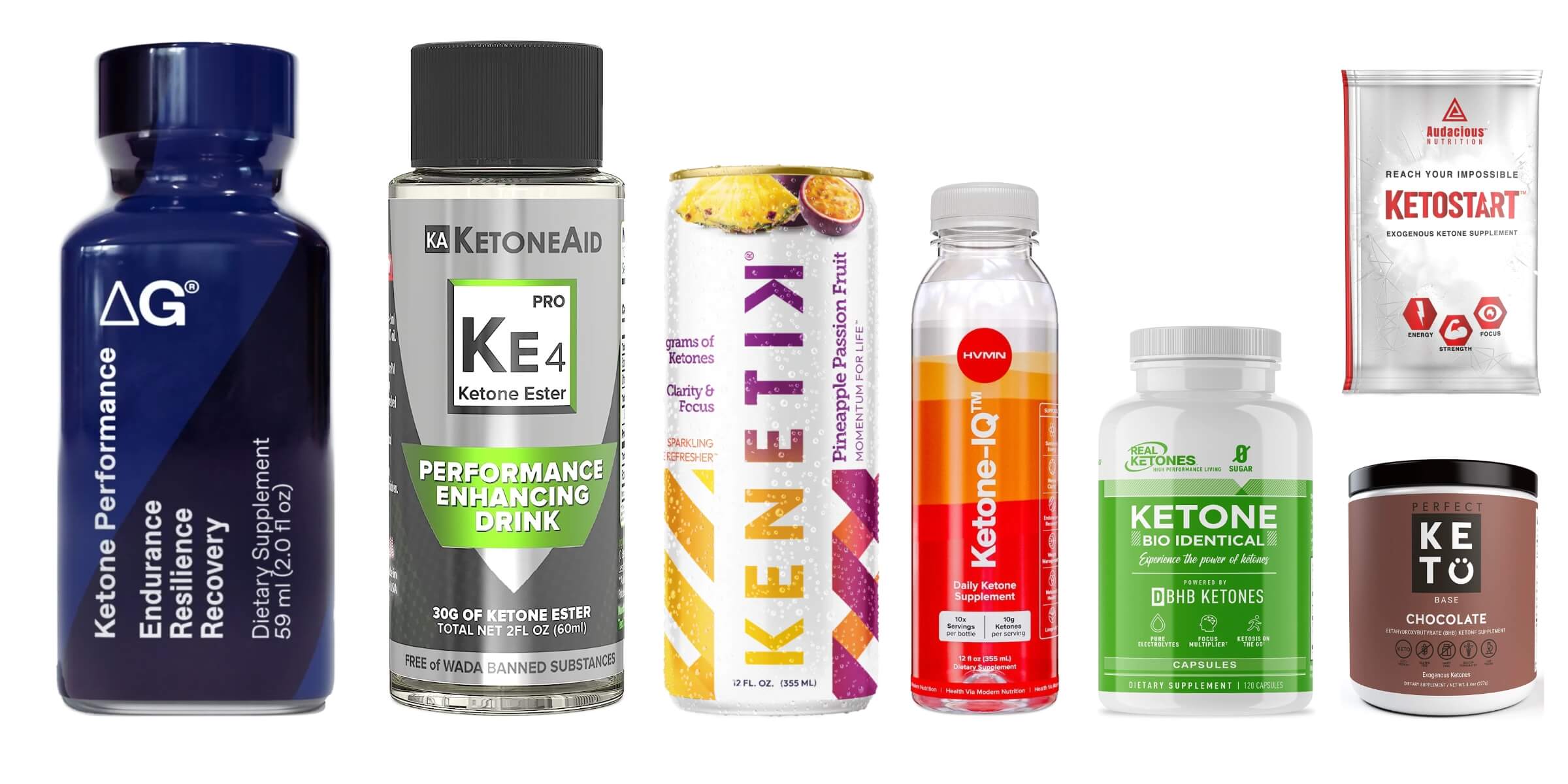
Below is a list of what I consider the top ketone supplements for a low-carb diet, based on the quality of their natural ingredients and their effectiveness.
However, even if you’re not following a ketogenic diet, some of these exogenous ketone supplements can help you improve your athletic performance and boost mental clarity.
I’ll share below how I leverage exogenous ketones, even on days that I consume moderate amounts of carbohydrates.
1. DeltaG Ketone Performance
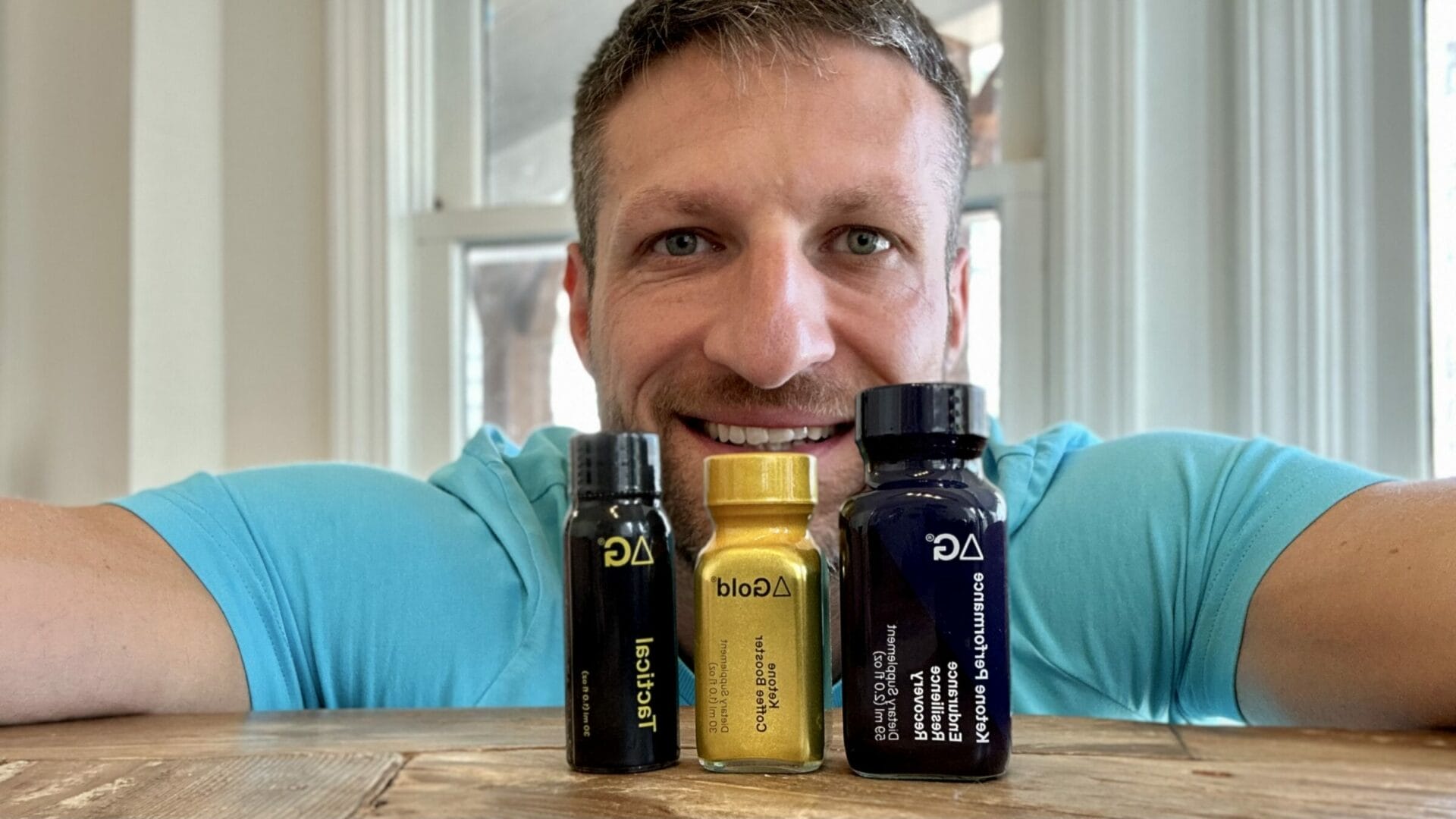
Pros
- Scientifically proven to improve endurance.
- It’s based on the original Oxford ketone ester.
- Used by elite athletes and special forces soldiers.
- Comes in glass bottles.
- Most effective at raising blood BHB levels.
Cons
- Tastes like medicine.
- Price.
DeltaG holds the patent on the original ketone ester developed by Oxford University for the U.S. Department of Defense. In other words, the company has unique access to the purest and highest-quality ketone ester on the market.
DeltaG offers various formulations of its ketone ester, including △G Ketone Performance, △G Tactical, △Gold Ketone Coffee Booster and △H Ketone Health.
For the initial version of this review, I got three bottles of the △G Ketone Performance that I leveraged strategically for the annual Murph Challenge, which is an intense CrossFit workout that includes a one-mile run, 100 pull-ups, 200 pushups, 300 air squats and another one-mile run — all while wearing a 20-pound weighted vest.
To make the workout even more challenging, my buddy and I decided to fast for 48 hours leading up to the workout. I did the same thing two years ago, and I wanted to see if DeltaG could help me improve my performance.
I expected to perform better when fueled by ketones, but I didn’t expect to crush my previous fasted personal record by 10 minutes! Considering that I’m not getting any younger and I don’t work out as much (or as hard) as I did two years ago, I attribute my performance improvement to DeltaG.
Of course, I kept tabs on my breath ketone levels using my Biosense breath ketone meter during the entire experiment and noticed a dramatic and lasting spike in ketones after consuming two bottles (50 grams) of this ketone ester. As you can see in the screenshot below, my ketone levels increased from 18 to 34 aces after I consumed DeltaG at approximately 8 a.m.
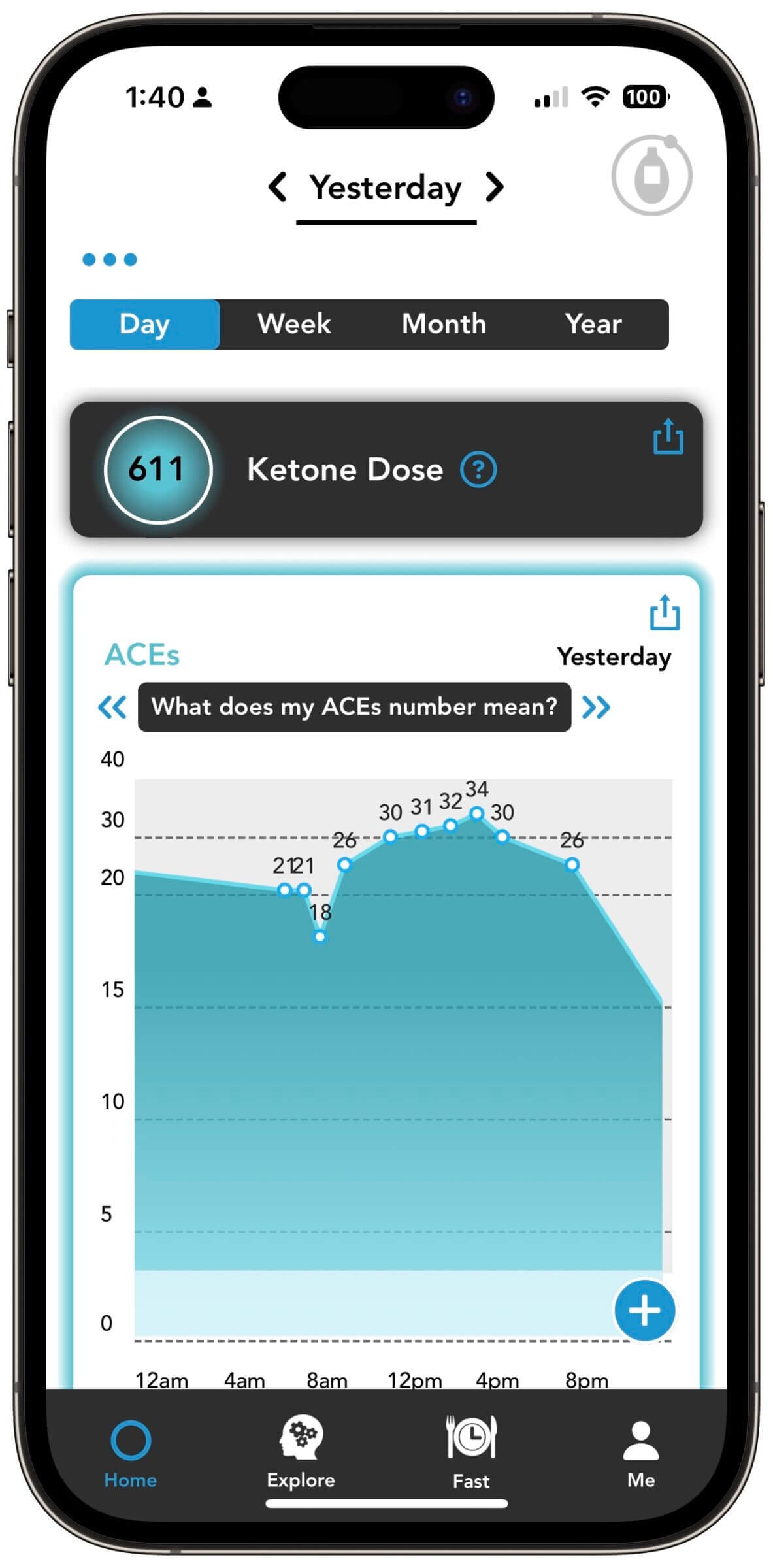
On a side note, another thing I really like about DeltaG is that they ship their products in eco-friendly glass bottles that are better for the environment and free of endocrine-disrupting chemicals (as I explained in my article about the dangers of xenoestrogens).
The only downsides to this ketone ester are the taste and the price.
All ketone esters taste like medicine and while DeltaG added some natural, non-caloric sweeteners to improve the taste, the liquid still tastes slightly bitter.
If you look at DeltaG Performance’s price tag, you might think it’s the most expensive product in the lineup. But that’s not the case if you consider that each pack contains 75 grams of ketones. In other words, you pay just over $1 per gram of ketone ester. That’s very reasonable considering the quality, purity and effectiveness of the product.
If you want to give DeltaG a try, make sure to use code MICHAELKUMMER to get 10% off your one-time purchase.
Note that DeltaG is not available on Amazon or other marketplaces.
2. KetoneAid KE4 Pro
Pros
- Scientifically proven to improve endurance.
- Small serving size.
- Costs only $1 per gram of ketones.
Cons
- Tastes like medicine.
KetoneAid’s KE4 Pro is the only other real ketone ester drink I’ve found available on the market. It’s highly concentrated and delivers 2.5 grams of ketone esters per 5 milliliter serving. Considering that ketone esters are the most effective form of exogenous ketones, it’s arguably one of the best products on the market.
Be aware that KE4 does not taste great. KetoneAid’s formula uses a small amount of organic stevia and citric acid to improve the flavor, but there’s only so much that a little bit of sweetener can do.
Of course, the typical serving size of KE4 is 5 to 15 milliliters, so you don’t have to drink a gallon for it to be effective. Plus, you can dilute it with a few ounces of water if you have sensitive taste buds. I wasn’t bothered by the taste at all, but drinking it did remind me of some of the bitter medicines I had when I was a kid.
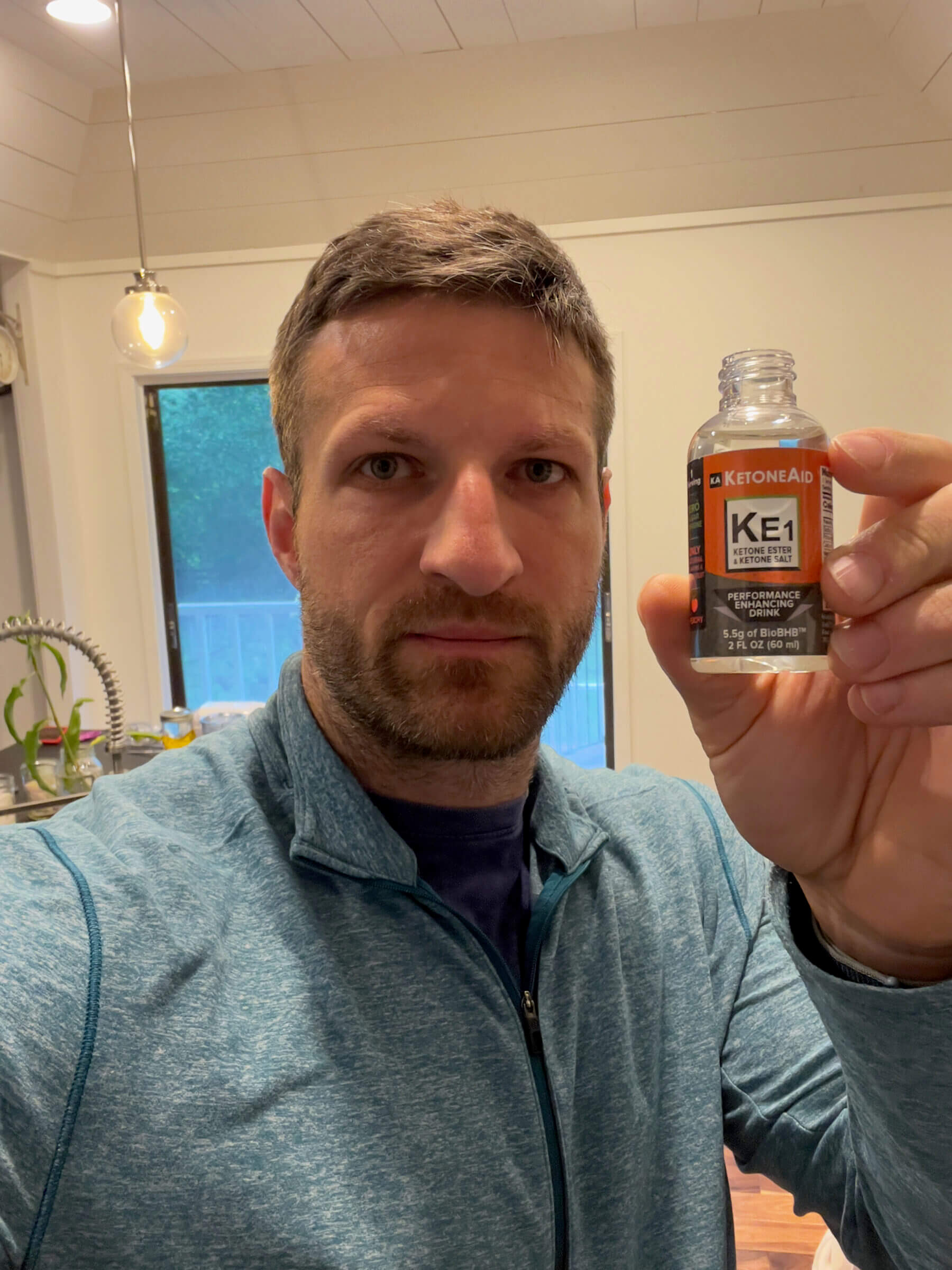
The good news is that KetoneAid also offers a less-strong-tasting alternative to KE4 called KE1, which combines ketone esters and ketone salts. I tried KE1 and can report that it tastes similar to HVMN’s Ketone-IQ (discussed below).
Overall, I’ve become a huge fan of KetoneAid because their supplements are highly effective and give you excellent bang for your buck.
You can also purchase KE4 Pro on Amazon, where single bottles are available.
3. Kenetik Ketone Drink
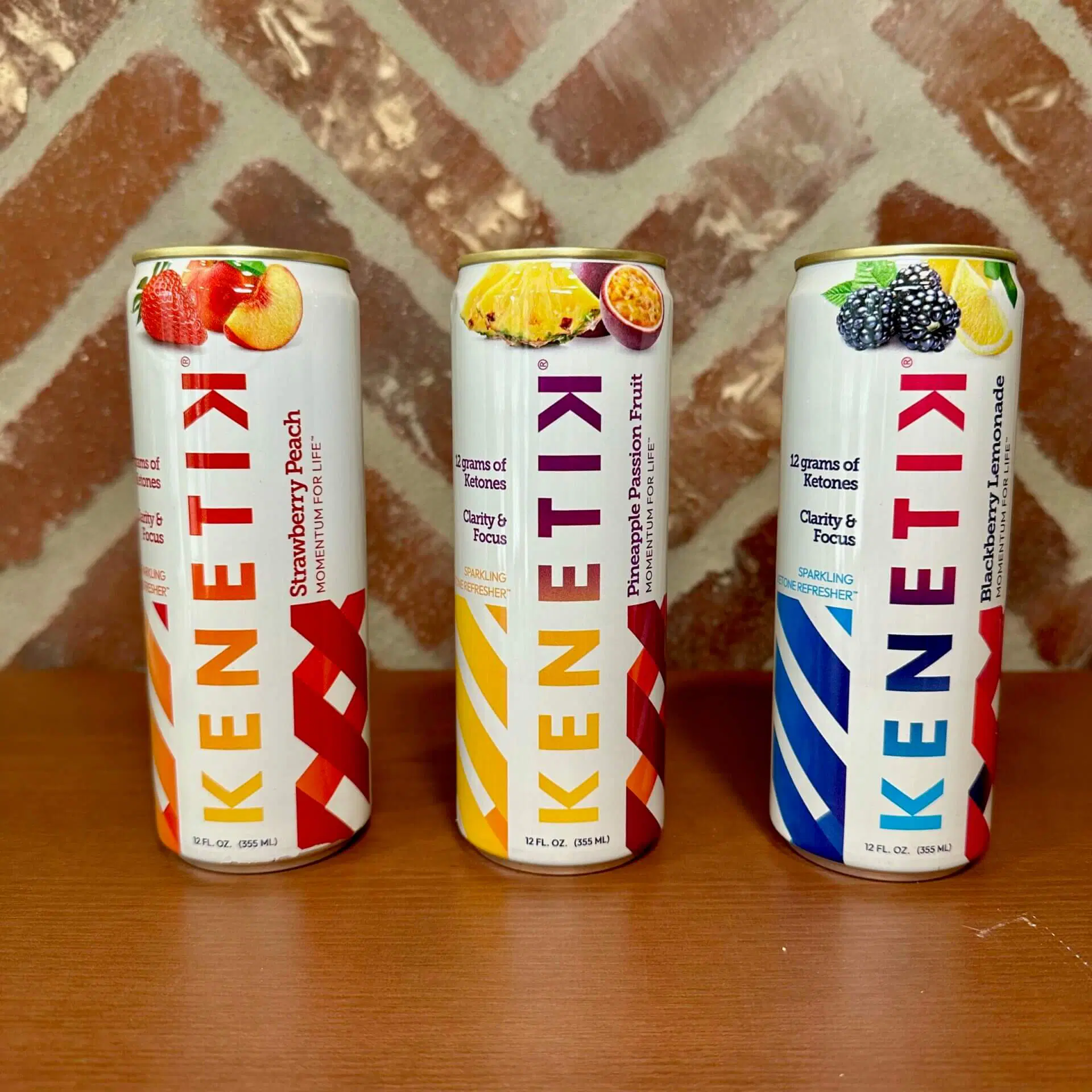
Pros
- Incredible taste.
- Scientifically proven to raise blood ketone levels.
- Approved by the American Brain Council.
Cons
- Price per serving.
- Less effective than an ester.
In 2021, I attended the KetoCon conference in Austin, Texas, where I had a chance to try Kenetik. When I took the first sip, I expected the medicine-like taste that I’ve gotten used to from other ketone supplements. But contrary to my expectations, I was blown away by how delicious this drink is.
When I looked at the nutrition facts, I realized that Kenetik’s Ketone Drink uses pure D-beta-hydroxybutyric acid combined with (R)-1,3-butanediol. In other words, the ketones in Kenetik are neither bound to salts nor are they part of an ester.
So how effective is Kenetik at raising blood ketone levels?
In one study, a single serving of Kenetik (10 grams) raised blood BHB levels in participants to 1.5 mmol/L — the same as ketone (mono) esters. In comparison, 10 grams of D-BHB salts increased blood BHB levels to only 0.7 mmol/L.
To find out what impact Kenetik would have on my ketone levels, I drank two bottles within four hours at the conference. Doing so increased my breath ketone levels to 14 ACES (the equivalent of 1.4 mmol/L). Additionally, I felt a noticeable boost in mental clarity and my desire to eat went away (I had been fasting the entire day).
If you combine Kenetik’s effectiveness and taste, you can see why this is one of my favorite exogenous ketone supplements. The only downside is its relatively high price of almost $9 per serving. To make the pricing more palatable, you can sign up for a subscription, which knocks 15% off the purchase price.
To save even more, make sure to use promo code MK15 for an extra 15% discount.
Note that Kenetik is also available as a ketone concentrate that you can drink straight up or mix with sparkling water. The advantage of the concentrate is its relatively low cost per serving of $3.54 with a subscription.
4. HVMN – Ketone-IQ
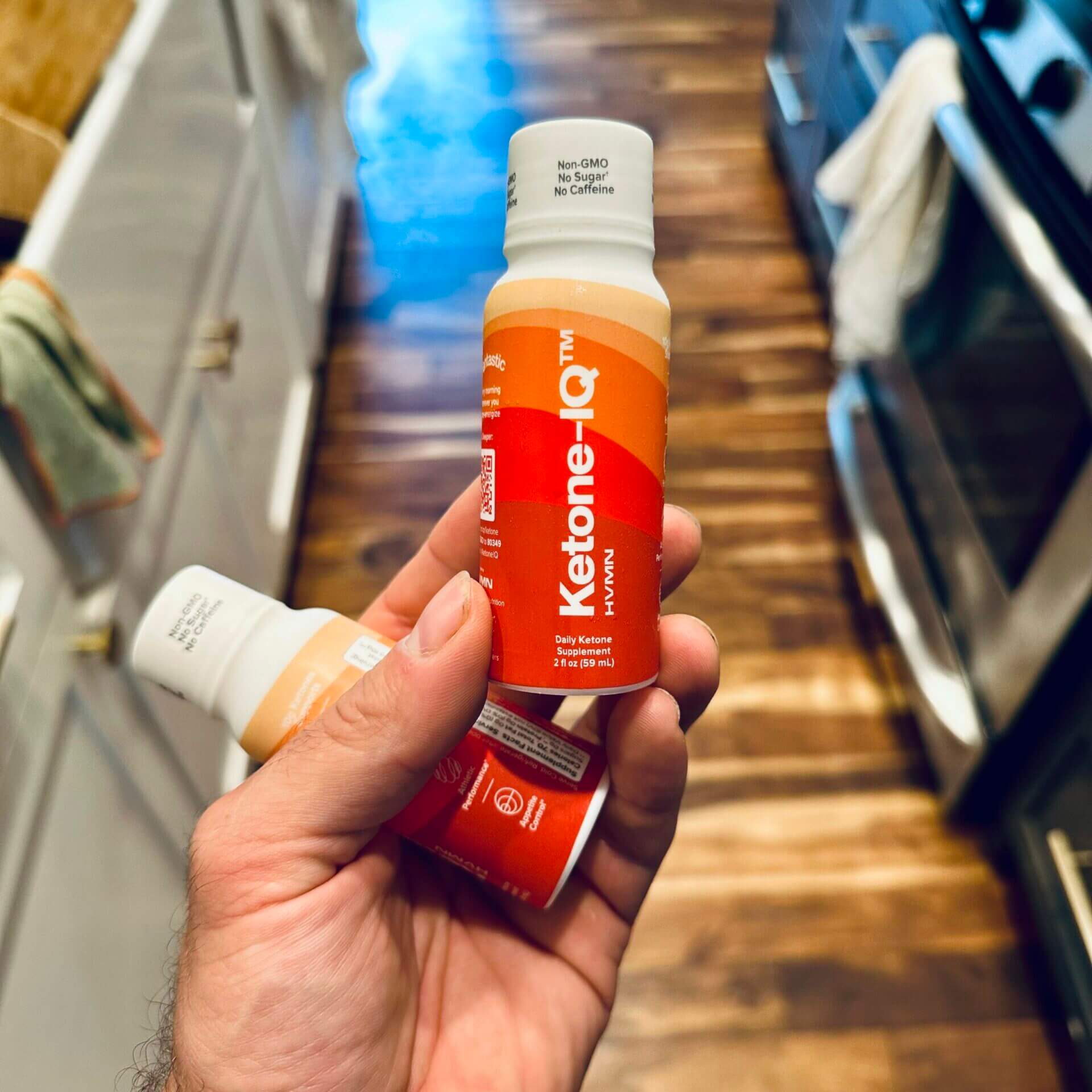
Pros
- Convenient delivery format (liquid).
- Doesn’t trigger an insulin response.
- Lack of salts means less risk of GI irritation.
Cons
- Price.
- Less effective than ketone esters.
- Comes in plastic containers.
Ketone-IQ is the recently-launched successor to “Ketone Ester,” a product HVMN specifically developed to help elite athletes improve their performance. It’s one of the few consumer products that delivers ketone bodies as an alcohol (in the form of (R)-1,3-butanediol) rather than as electrolytes (salts).
However, it’s important to understand that Ketone-IQ is not an ester, since it contains only (R)-1,3-butanediol (one half of an ester). As a result, Ketone-IQ is liquid rather than powder, like some of the other products in this review.
I used Ketone-IQ for a few weeks, primarily before intense CrossFit workouts or when I wanted to boost my mental clarity. What I noticed was that taking a shot of Ketone-IQ before a workout improved my endurance, as long as my heart rate remained at 160 bpm or lower.
But if I crossed that 160 bpm threshold, I started fatiguing at the same rate as I would have without a ketone supplement. That’s because, at that point, my body would switch to an energy system that relies predominantly on glucose and glycogen. If I’m low on both, my performance degrades quickly.
The other thing I noticed was a boost in energy and mental clarity, thanks to the fact that the supplement raised both my blood and breath ketone levels (as measured via finger prick test and using my Biosense breath ketone meter).
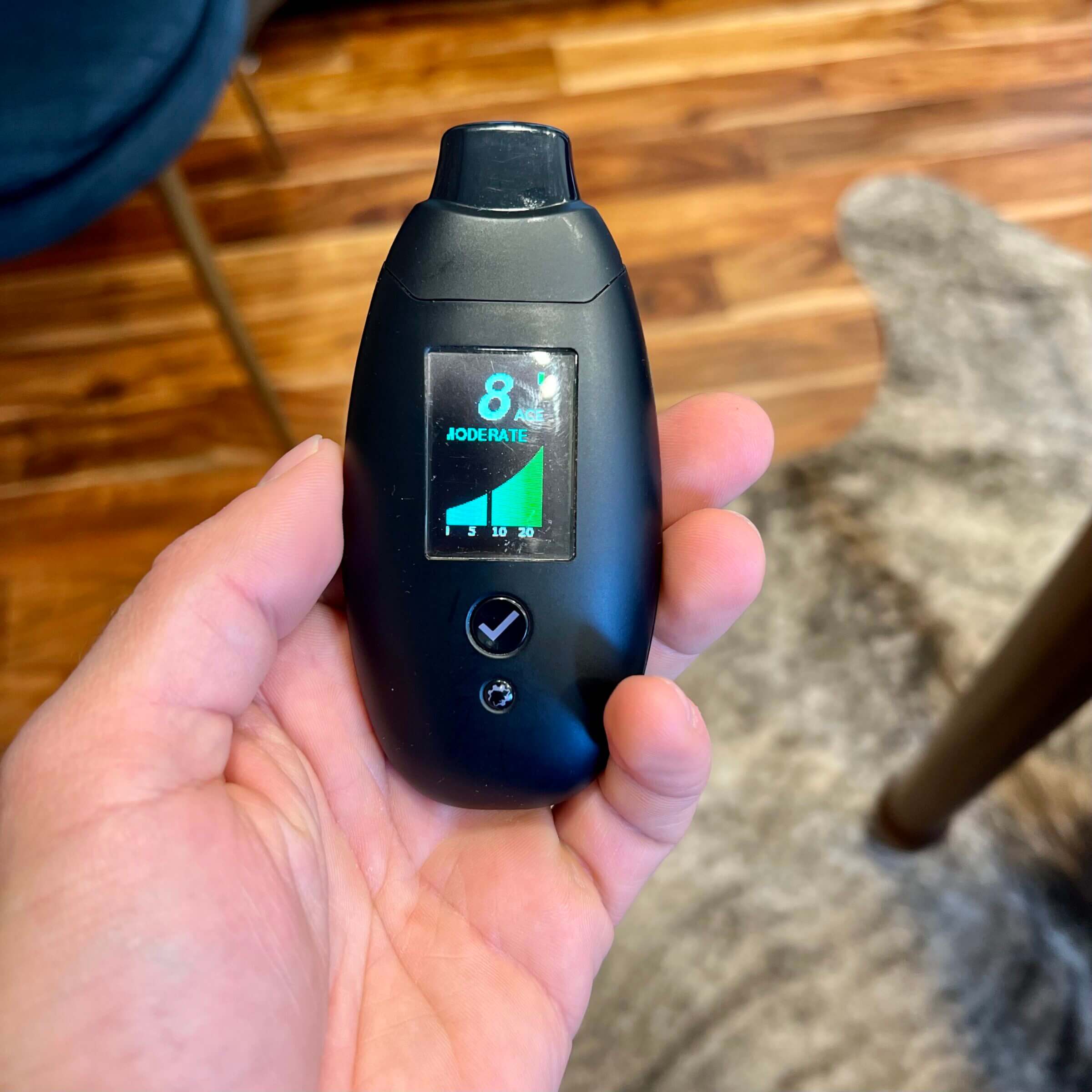
A clear benefit of Ketone-IQ (and (R)-1,3-butanediol in general) is that its lack of salts reduces the risk of upsetting your stomach, especially if you take the product several times a day.
One of the downsides of Ketone-IQ is that it comes in plastic containers that can leach endocrine-disrupting chemicals into the liquid, much like plastic water bottles do. Additionally, consuming too much Ketone-IQ can give you a buzz (butanediol is an alcohol after all), so it might not be suitable for athletes. I had no issues with one to three shots of Ketone-IQ before workouts but your mileage may vary.
Ketone-IQ is also available on Amazon.
5. Real Ketones – D-BHB Capsules
Pros
- Contains only D-BHB.
- Available with or without caffeine.
- Tasteless (capsule).
- Third-party tested.
Cons
- Potentially less effective than ketone esters.
Real Ketones is one of the few products available that contains only nature-identical D-BHB, as opposed to a DL-BHB mix.
As a result, you get twice the amount of energy-producing BHB (when comparing equal serving sizes) with Real Ketones than with the other powdered products in this review. On the flip side, you get none of the unique anti-inflammatory and brain health benefits L-BHB has to offer.
I also like that Real Ketones offers a caffeinated and non-caffeinated version of its supplement. If you choose the caffeinated version, just don’t mistake the (comparatively strong) stimulating effect of the caffeine with that of the ketones. That’s why I recommend trying the non-caffeinated version first (to see how you respond to the ketones before adding caffeine).
It’s also worth noting that Real Ketones decided to include BHB that is only bound to sodium instead of other (potentially gut-irritating) minerals. As a result, you shouldn’t experience any GI issues — even at higher doses.
From a pricing perspective, Real Ketones costs $0.80 per serving (1.9 grams of D-BHB). That’s reasonable, considering that capsules are usually more expensive than plain powder.
To learn how the cost per gram of D-BHB in Real Ketones capsules compares to other products, check out my side-by-side comparison table below.
Note that Real Ketones is also available in powdered form for a slightly lower cost per serving, but only with flavors and additional minerals (e.g., magnesium) beyond sodium.
You can also find both versions of Real Ketones on Amazon.
6. Audacious Nutrition – KETOSTART
Pros
- Developed by scientists.
- Tastes great.
- Gentler on the digestive system than most other ketone salts.
- Available with or without caffeine.
Cons
- If you have a sensitive GI tract, you might still experience minor side effects.
KETOSTART is arguably one of the best powdered D/L-BHB supplements on the market. It was developed by Csilla Ari, PhD, who is married to neuroscientist Dom D’Agostino, two researchers who have been using exogenous ketones as part of their scientific studies.
Their idea was to bring a ketone supplement to market that would match the quality and efficacy of the ketones they’ve been using in the lab. KETOSTART by Audacious Nutrition, the company run by Dr. Ari, is exactly that.
My wife and I had a chance to try KETOSTART and we both noticed a boost in athletic performance when working out in a fasted state, as well as reduced feelings of hunger.
I should also mention that my wife has a much less sensitive stomach than I do (even though she doesn’t tolerate magnesium as well), and she didn’t feel any of the symptoms (such as bloating) that often accompany ketone salts. On the other hand, I have a relatively sensitive stomach (but higher magnesium tolerance) and noticed some minor discomfort — though much less than what I have experienced after consuming other ketone salt supplements.
What’s great about KETOSTART is that the product is available with or without caffeine. So if your goal is to boost athletic performance during a morning workout, the formula with caffeine might be your best bet. Since I’m also relatively sensitive to caffeine, I stuck with the caffeine-free formula on most days.
As far as the taste of KETOSTART is concerned, I really liked it and thought that the level of sweetness was quite balanced.
Use promo code MICHAELKUMMER to get 10% off any Audacious Nutrition order.
KETOSTART is also available on Amazon.
7. Perfect Keto Base
Pros
- No artificial flavors.
- Paleo-friendly sweeteners.
- 11.4 g of D/L-BHB.
Cons
- High amount of magnesium might cause GI irritation.
Perfect Keto’s exogenous ketone base was the first keto supplement I tried when I started a ketogenic diet a few years ago.
What I like about this exogenous ketone base is that it’s plain and simple, and without any “extra” ingredients you might not want. Instead, it contains 11.4 grams of D/L-BHB in the form of electrolytes, such as sodium, magnesium and calcium.
If your body isn’t used to high amounts of magnesium, you might have to start with less than a full serving of this supplement because a single serving has 98% of the daily value of that particular mineral. While magnesium is important, some people experience GI irritation when they consume so much of it in one shot.
Perfect Keto Base has only 20 calories and less than one gram of carbs per serving. While that’s nowhere near enough to kick you out of ketosis, it technically breaks your fast. So be aware of that if you practice intermittent fasting in addition to maintaining a ketogenic diet.
Perfect Keto’s ketone base is available in the following flavors:
- Chocolate
- Strawberry Lemonade
- Vanilla
In addition to the tubs (which are great for use at home), Perfect Keto also offers BHB capsules and single-serving packs (which are great for traveling).
Be sure to use promo code MICHAEL20 for 20% off your order.
You can also find Perfect Keto Base on Amazon.
Side-By-Side Comparison
Below is a side-by-side comparison table of all the ketone supplements I tested for this article, including their effectiveness in raising blood D-BHB levels.
| Brand | Bond | Peak Blood D-BHB Levels | Serving Size |
|---|---|---|---|
| DeltaG | Ester | 4.8 mmol/L | 27 g |
| Kenetik | Acid and alcohol | 1.3 mmol/L | 12 g |
| KetoneAid | Ester | 4.2 mmol/L | 30 g |
| HVMN | Alcohol | 1.3 mmol/L | 10 g |
| Real Ketones | Salt | 0.6 mmol/L | 10 g |
| Audacious Nutrition | Salt | 1.3 mmol/L | 10 g |
| Perfect Keto | Salt | 0.8 mmol/L | 11.4 g |
Other Ketone Supplements to Consider
Besides the products I’ve listed above, there are a couple of exogenous ketone supplements that readers have asked me about:
- Juvenescence – Metabolic Switch Drink: Juvalabs’s product is a C6 Ketone Di-ester, but in powder form. Each serving contains 12.5 grams of ketones. Unfortunately, this supplement also contains soluble corn fiber, a highly-processed filler that I’m not a fan of.
- Prüvit – KETO//OS: A liquid ketone supplement that contains a 12-gram blend of amino acids and DL-BHB. What I don’t like about this product is its relatively high price per serving ($6.50). Plus, it’s not clear how much BHB each serving contains.
Exogenous Ketones vs. Keto Shakes
Unlike keto meal replacement shakes, exogenous ketone supplements don’t provide sufficient calories to replace a full meal. So if you’re looking for a keto-friendly product that provides liquid calories as opposed to ketones, choose one of those options instead.
However, if you’re looking for a ketone supplement to help you get started on a high-fat diet, or if you’re looking for something that eases the symptoms of the keto flu, exogenous ketone supplements are your best bet.
The problem is that the keto supplement market is flooded with products. Just go to Amazon, search for “exogenous ketones” and you’ll get over 350 results.
As you might expect, not all of those supplements are created equal. While they might each meet some technical standard for keto compatibility, a healthy diet is a way of life, not a means by which to achieve some short-term goal like weight loss.
Because of that, I care deeply about not only the keto compatibility and function of the products I consume, but also about the overall health impact of those products.
As a result, I take into account factors such as the quality of ingredients, the trustworthiness of the brand, the scientific evidence supporting the brand’s claims, and paleo compatibility before purchasing, consuming, reviewing and recommending products.
That’s why I’ve included only a handful of supplement brands in this article. These are the brands and their products that I have used and trust, and that I feel comfortable recommending to family, friends and readers.
Of course, I don’t doubt there are other reputable companies out there that make great products that I might not have heard about. If you’re one of them, shoot me an email and we can chat.
Health Benefits of Exogenous Ketone Supplements

I bet almost everyone who starts on a ketogenic diet tries a ketone supplement at some point. But do you need exogenous ketones? And, if so, what are the benefits? Some people even claim that exogenous ketone supplements are a scam that hurt more than they help.
The idea behind ketone supplements is to deliver the same or similar benefits that you get when your body is in nutritional ketosis.
But what does the scientific evidence say?
The short answer is that exogenous ketones are no replacement for a proper ketogenic lifestyle and a diet that puts your body into nutritional ketosis.
However, exogenous ketones can help by providing the following benefits:
- Improved cognitive performance.
- Extended peak cognitive performance during exercise.
- Increased endurance performance when you supplement with ketone esters.
- Less severe symptoms resulting from the keto flu.
- May treat or improve symptoms of patients with neurological conditions, such as Alzheimer’s disease.
- Can help you skip a meal without a drop in energy levels.
Improved Cognitive Performance
Your brain’s neurons and your heart prefer ketones over glucose as a form of energy. Plus, ketone bodies can easily cross the blood-brain barrier and thus act as an instant and effective source of fuel for your brain.
If you’re already on a ketogenic diet, you’ve probably noticed your improved focus and mental clarity compared to the high-carb diet you might have maintained before.
However, during the first few weeks of starting a ketogenic diet, you might feel everything but on top of your (mental) game. That’s where exogenous ketones can help to provide the fuel you aren’t getting due to other factors.
Extended Peak Cognitive Performance
If you’re an endurance athlete, you know that long races are mentally exhausting. Sometimes, it’s an athlete’s mental strength — as opposed to their physical dominance — that makes the difference between winning and losing.
Ketones can help you maintain your peak cognitive performance for longer, which can give you an edge in a race.
Increased Endurance Performance
Scientists have demonstrated an increase in endurance performance in athletes who supplemented with ketone esters before a competition. Think of it as a pre-workout supplement!
A study by Oxford University has shown that elite cyclists rode over 400 meters further in a 30-minute trial when fueled with carbs and ketone esters. While that 2% increase in performance might be unnoticeable to the average Joe, it makes a huge difference for elite athletes.
Lessens the Symptoms of the Keto Flu
During the first few days and weeks after having started a ketogenic diet, you might feel sluggish, fatigued, and suffer from brain fog — all common symptoms of the keto flu.
The keto flu is usually caused by an electrolyte imbalance, because you’re not taking in enough sodium.
By consuming exogenous ketone supplements in the form of salts, you can help replenish electrolytes and thus lessen your keto flu symptoms. However, you can also accomplish the same thing by just mixing 1-2 teaspoons of salt with warm water and drinking that instead.
You might also experience keto-flu-like symptoms when your brain runs out of fuel (glucose) before your body has become proficient in creating ketones. For such cases, exogenous ketones can help provide the fuel your brain needs.
Lessening the symptoms of the keto flu is one of the primary benefits of exogenous ketones. In fact, that was the reason why I stocked up on a couple of tubs of exogenous ketones before starting the diet.
Liver and Muscle Protection
Studies in rodents have shown that AcAc, one of the three ketone bodies, is used as fuel by macrophages (a special type of cells that act as inflammatory mediators) and can protect liver cells from diet-induced fibrosis and injury.
Additionally, AcAc helps with the proliferation and regeneration of muscle cells, which is why some athletes supplement with ketones to improve their recovery after intense workouts or competitions.
Treatment for Alzheimer’s Disease
The treatment of particular medical conditions isn’t the focus of this article. However, for the sake of completeness, I should mention that exogenous supplementation has been shown to be highly effective in patients with Alzheimer’s disease and other neurological and metabolic conditions — in particular the ones that are caused by a disturbed glucose metabolism due to a lifelong and high intake of carbohydrates.
To learn more about ketones in general, and their potential health benefits, check out the book Ketones, The Fourth Fuel by Travis Christofferson.
Drawbacks of Exogenous Ketone Supplements
Some people think of ketone supplements as a shortcut to ketosis, and as a way to lose weight without adopting a healthy lifestyle.
That doesn’t work over the long term.
When you consume exogenous ketones, your blood ketone levels go up. However, that doesn’t mean that you’re in endogenous ketosis. If you’re not, you forfeit many of the benefits of a ketogenic diet, including expedited weight loss.
However, supplementing with ketones provides your body with energy while suppressing hunger at the same time. As a result, you’ll likely consume fewer calories, which leads to weight loss.
I don’t recommend maintaining a caloric deficit for extended periods because your body will adjust to it and start preserving body fat. That’s counter-productive as far as weight loss is concerned.
However, there is nothing wrong with doing that for a few weeks while making sure you consume nutrient-dense foods (ideally from animal-based sources).
Unfortunately, there aren’t a lot of long-term studies on ketone supplementation available. However, based on my experience, I recommend using ketone supplements during the first few weeks of your keto journey while you dial-in your nutritional needs and fat consumption.
I used exogenous ketones the first week I was on a keto diet, until I figured out my correct fat and salt intake (and to prevent/lessen the symptoms of the keto flu).
Ketone Supplements Side Effects
Ketone supplements are considered to be safe, but there are a handful of side effects that some people experience, including:
- Gastrointestinal problems, such as diarrhea, nausea and stomach discomfort. That’s one of the reasons why I like the products from DeltaG and KetoneAid — they don’t cause any stomach issues even when consumed in higher amounts.
- Breaking your fast. If you practice intermittent fasting (or any other kind of nutritional fasting), you need to be aware that ketone supplements can break your fast (depending on what your fasting goals are). However, I’d argue that being able to extend your fast by consuming a few calories in the form of exogenous ketones has more benefits than completely breaking a fast with a meal but without ketone supplementation.
- Liver damage. Dr. Ari (the scientist behind KETOSTART) told me that “chronic use of ketone esters can cause serious liver damage.” However, I haven’t seen any published scientific evidence confirming that. In fact, a study published in the American Journal of Physiology – Gastrointestinal and Liver Physiology suggests that ketone esters are liver-protective. Dr. Ari mentioned a soon-to-be-published study confirming her warning, and I’ll keep an eye out for it.
- Intoxication. 1,3 butanediol is a mildly narcotic alcohol that can also put pressure on the liver. However, in all my tests, I have yet to experience any sense of intoxication.
- Increase in insulin. Raising your blood ketone levels too much (above ~2 mmol/L) can cause a release of insulin, which can negatively impact endogenous ketone production and prevent fat loss. That’s why it’s important not to over consume ketone esters (which are very effective at raising blood ketone levels).
How I Use Exogenous Ketones
I was on a strict ketogenic diet for several years, before I began re-introducing carbohydrates in 2021. I wish I had leveraged exogenous ketones more extensively during that time, because it would have made the experience significantly more pleasant — especially for longer fasts and intense CrossFit workouts.
I’m still on a relatively low-carbohydrate diet, but I’m no longer in deep ketosis on most days. Despite that, I still strategically leverage exogenous ketone supplements to improve my athletic performance and to boost my mental clarity.
For example, supplementing with (R)-1,3-butanediol or ketone esters before CrossFit workouts has noticeably improved my athletic performance and allowed me to recover quicker — both mentally and physically.
Additionally, I supplement with ketones when I need my brain to work optimally — especially while recording videos for my YouTube channel or writing research-intensive articles for my blog.
If you’ve been in deep ketosis before, you’ve undoubtedly noticed the incredible mental clarity that ketones offer. You can get the same effect with high-quality ketone supplements!
Just be aware that supplementing with exogenous ketones won’t offer any of the fat-burning or weight loss benefits that endogenous ketones offer (unless you leverage exogenous ketones to skip meals and extend your fasts).
Frequently Asked Questions
Ketone bodies — or ketones — are an alternative fuel source for your body. If you follow the standard American diet (SAD), your body uses glucose for fuel. On a high-fat diet, such as the ketogenic diet, your liver can produce ketones for your body to use as fuel. Three of the ketone bodies you might have heard about include acetone, acetoacetic acid, and beta-hydroxybutyric acid (BHB).
While your liver can make ketones from fat — either from the fat you eat or the fat stored in your body — you can also get them from supplements. Ketones made by the body are called endogenous (having an internal origin). Ketones supplied via supplements are called exogenous ketones.
The supplements in this review provide ketone bodies in powder or liquid form, which go directly into your bloodstream so your body can use them for energy. Most of the supplements in this review include beta-hydroxybutyric acid in the form of salts, such as calcium, magnesium, sodium or potassium.
Yes, but perhaps not in the way you think. Consuming exogenous ketones (i.e., ketone supplements) does cause your blood ketone levels to go up. But it should go without saying that just having more ketones in your blood does not mean you’re in nutritional ketosis.
The whole point of a ketogenic diet is to shift your body’s primary fuel source from sugar to fat. You could eat a pound of ketones, but that would not put you in ketosis. As a result, you wouldn’t get many of the benefits associated with keto.
My stance on ketone supplements is the same as with any other supplement: you can use them to supplement, but not replace, an otherwise healthy lifestyle. Think of exogenous ketones the same way you think about vitamin and mineral supplements — use them to fill the gaps, not as a way to eat crappy food and then take shortcuts.
Exogenous ketones raise your blood ketone levels, but they don’t automatically put you into nutritional ketosis.
You can raise your blood ketone levels by entering nutritional ketosis or by supplementing with exogenous ketones. The best way to expedite that process is by combining your ketogenic diet with intermittent fasting. You can learn more about ketosis and ketone levels in my ketogenic diet guide.
No, you don’t. But keep in mind that supplementing with exogenous ketones doesn’t provide all the same benefits as a ketogenic diet.
No, ketones don’t burn fat. It’s the other way around. Ketones are the product of nutritional ketosis. In other words, your liver makes ketones when your body burns fat for energy.
You probably don’t. I would focus all my energy on remaining in nutritional ketosis to allow your body to burn its own fat. If you’re new to keto and how to apply it in the context of weight loss, check out my ultimate keto guide.
Probably not. Keep in mind that when you supplement with exogenous ketones, you effectively halt your body’s conversion of body fat into ketones. However, some supplements include compounds, such as amino acids, that support your body’s metabolism and fat-burning engine. I don’t know if that’s enough to compensate for the lack of ketone production.
If weight loss and fat burning are your primary goals, I’d let your body be in nutritional ketosis and burn fat for energy. There are no magic keto weight loss pills that can make up for an unhealthy lifestyle! You can learn more in my list of the best diets for weight loss and my article on the likely reasons you’re not losing weight.
That depends on your fasting goals. If resetting your gut microbiome or autophagy are your primary goals, then supplementing with exogenous ketones won’t negatively impact that. However, if your primary goal is losing body weight (and body fat in particular), then I’d avoid consuming any source of energy (including ketones) during your fasting window.
You can certainly take exogenous ketones to break your fast. I have used them towards the end of my fasting cycle and before starting a strenuous workout session. That way, I give my body some extra fuel to sustain the workout. However, as I mentioned above, ketone supplements have calories and they can impact your blood sugar levels, which means they can break your fast.
Theoretically, you could overdose on exogenous ketones and enter a state called hyperketonemia or ketoacidosis. However, you’d have to consume several times the daily recommended dosage to achieve that. If you follow the instructions on the label, there is no risk of ketoacidosis.
Exogenous ketones might help reduce the symptoms of the keto flu. Remember, the keto flu is largely preventable but often caused low electrolyte levels (especially low sodium). Low energy levels due to carb withdrawal can exacerbate keto flu symptoms.
Salt-based exogenous ketone supplements provide all the ingredients your body is lacking while experiencing the symptoms of the keto flu: salts (minerals), and ketones (energy).
Any sudden change in dietary habits might cause diarrhea — especially an increased intake of fat, sugar alcohols (from supplements) and magnesium. Magnesium is a common ingredient in ketone salts.
Some studies have shown that supplementing with ketone esters while fasting can suppress your appetite due to lower levels of the “hunger hormone” ghrelin. Without fasting, no such effects have been observed.
Yes, but it depends on the type of exercise you’re doing and the type of ketone supplement. Observational studies have shown that endurance and weightlifting athletes can do very well on a ketogenic diet by using ketones as a source of energy.
Several studies have shown increased performance (2% to 3%) among cyclists and other endurance athletes who used ketone ester — as opposed to ketone salt — supplements.
However, if you’re doing high-intensity workouts such as CrossFit, your body will likely benefit from glucose as its primary source of energy. (See my article on what to eat before and after a workout for more info.)
Raspberry ketones are what give red raspberries their powerful aroma. But despite their name, they’ve got nothing to do with the ketone bodies your body can make (or the ones you find in exogenous ketone supplements).
Still, some people claim that raspberry ketones — mixed with green tea — can help with weight loss by breaking down fat and making cells more susceptible to the fat-burning hormone norepinephrine, among other things.
However, there is not a single scientific study that was performed on humans to back up any of those claims. What’s more, natural raspberry ketones are incredibly expensive to manufacture, as you need 90 pounds of raspberries for a single dose.
As a result, all of the raspberry ketone supplements on the market are synthetic.
There is no connection between exogenous ketones and MCT oil. (MCT stands for medium-chain triglycerides, and can be found in coconut oil and various supplements.)
The cool thing about certain MCTs — such as caprylic acid, also known as C8 — is that your body can convert them quickly into ketones. As a result, MCT oil is another beneficial supplement to help your body get into and stay in nutritional ketosis.
However, don’t consume too much MCT oil, because doing so can upset your stomach and cause cramping and diarrhea.
Yes, the body can convert some of the medium-chain triglycerides in MCT oil (in particular C8) to ketone bodies. As a result, supplementing with MCT C8 can increase your blood ketone levels.
BHB or beta-hydroxybutyric acid is a ketone body and the byproduct of nutritional ketosis. It’s also one of the ketone bodies that supplement manufacturers bind to salts to make their supplements. As a result, BHB can be both an endogenous and exogenous ketone body.
You can certainly eat carbs and take exogenous ketones. However, if your goal is to get into nutritional ketosis, you should limit your carbohydrate intake to about 5% of your daily calories.
With that said, some athletes have had success with fueling their bodies with both glucose and ketones at the same time. The idea behind “duel fueling” is to provide the body with sufficient amounts of both types of fuel so it can use what it needs for optimal performance.
As mentioned above, supplementing with ketone esters can slightly improve the physical performance of endurance athletes. Ketone ester supplementation can also lower blood lactic acid. Remember, lactic acid builds up when your body is burning carbs at a high rate, without enough oxygen. The lower lactic acid levels might be related to lower glycogen use during exercise when you supplement with ketone esters.
The main issue I see with any type of dietary supplement is that people use them as shortcuts for an otherwise bad dietary lifestyle. That won’t work. As the name implies, supplements are meant to supplement an otherwise healthy dietary lifestyle and to fill the gaps we can’t because of work, travel or other factors.
Scientists often study the effects of new dietary supplements or medication on rats before they consider it safe repeating the study on humans. In some cases, the effects discovered in rats can be reproduced in humans, but in other cases those effects don’t translate to humans. That’s why I recommend treating results from scientific studies performed on rats as a hypothesis rather than a fact.
Alzheimer’s is a disease that’s caused by inflammation and a disturbed glucose metabolism in the brain. What that means is that the brain can’t properly use glucose for fuel and the affected brain cells start deteriorating.
At the same time, the brain retains its ability to use ketones for fuel. That’s why doctors have started treating Alzheimer’s patients with ketone supplements to fuel their brain.
Ketones are not a natural source of gluten. However, some brands manufacture their ketone supplements in facilities that also produce other supplements that may contain gluten (e.g., meal shakes). So if you have celiac disease, I’d double-check with the manufacturer to assess the risk of cross-contamination.
Yes, exogenous ketone supplements can help increase your energy levels and make you more alert and focused, because they’re a source of fuel (especially for the brain).
Apple cider vinegar contains malic acid, a ketone precursor. Additionally, studies have shown that apple cider vinegar can increase insulin sensitivity and stimulate glucose uptake after meals, thus making it easier to get into ketosis. The latter is the reason why some dieters consider apple cider vinegar an effective tool to improve their weight loss results.
Potentially! There is pre-clinical evidence to suggest that “ketone administration alone might afford anti-seizure benefits for patients with epilepsy.”
Both D-BHB and L-BHB are BHB isomers that have the same chemical formula, but some of their atoms are arranged differently.
Chemically, the main difference between D-BHB and L-BHB is in the position of –OH group in the penultimate carbon atom. In the nature-identical D isomer, the OH- group of the penultimate carbon is positioned on the right side, whereas in the L isomer, the OH- group of the penultimate carbon is positioned on the left side.
Note that when the human body makes BHB, it’s predominantly D-BHB.
However, L-BHB tends to stay in the body longer and it acts as a signaling molecule. Some people argue that could have benefits beyond energy production.
The Best Ketone Supplements: Final Thoughts
Exogenous ketones can be a beneficial tool to support your ketogenic journey. Just don’t forget that high-quality supplements are meant to supplement an otherwise healthy dietary lifestyle — as opposed to enabling you to take shortcuts.
With that in mind, exogenous ketones are a convenient way to improve your endurance during certain types of exercises, to fuel your brain with energy when you need it, to provide an overall energy boost, and to reduce the symptoms of the keto flu.
I used ketone supplements when I first started on a ketogenic paleo diet to help lessen the symptoms of the keto flu, and I would do it again. After I had been on keto for several months, I stopped using ketone supplements (except for testing new products to review).
These days, I strategically use exogenous ketones before certain workouts and to improve my mental performance.
What’s your experience with exogenous ketones, and what’s your favorite product? Let me know by leaving a comment below!

Michael Kummer is a healthy living enthusiast and CrossFit athlete whose goal is to help people achieve optimal health by bridging the gap between ancestral living and the demands of modern society.
Medical Disclaimer
The information shared on this blog is for educational purposes only, is not a substitute for the advice of medical doctors or registered dieticians (which we are not) and should not be used to prevent, diagnose, or treat any condition. Consult with a physician before starting a fitness regimen, adding supplements to your diet, or making other changes that may affect your medications, treatment plan or overall health. MichaelKummer.com and its owner MK Media Group, LLC are not liable for how you use and implement the information shared here, which is based on the opinions of the authors formed after engaging in personal use and research. We recommend products, services, or programs and are sometimes compensated for doing so as affiliates. Please read our Terms and Conditions for further information, including our privacy policy.
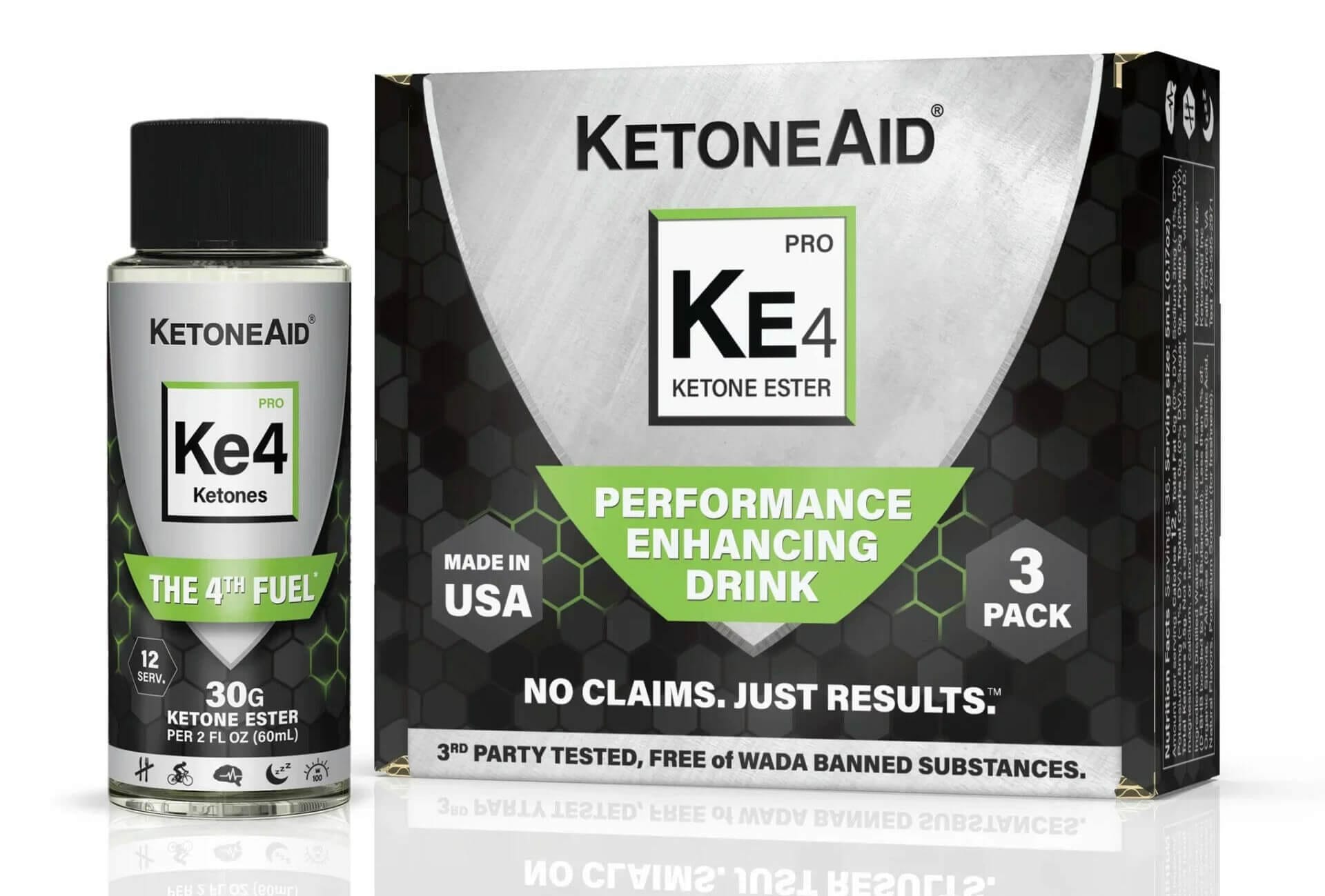
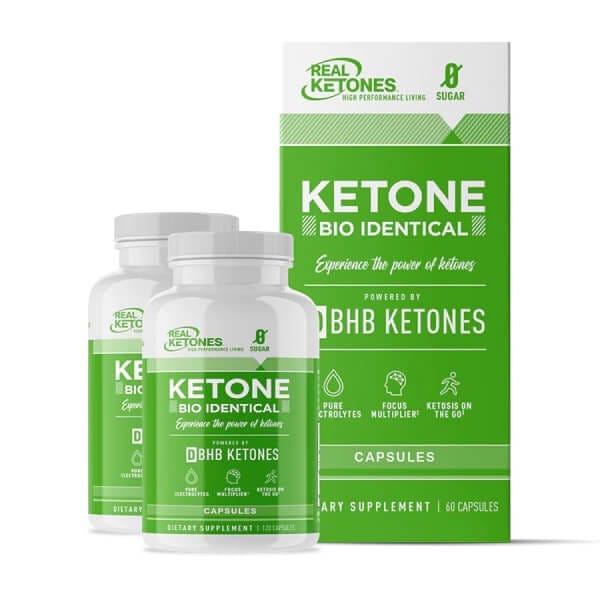
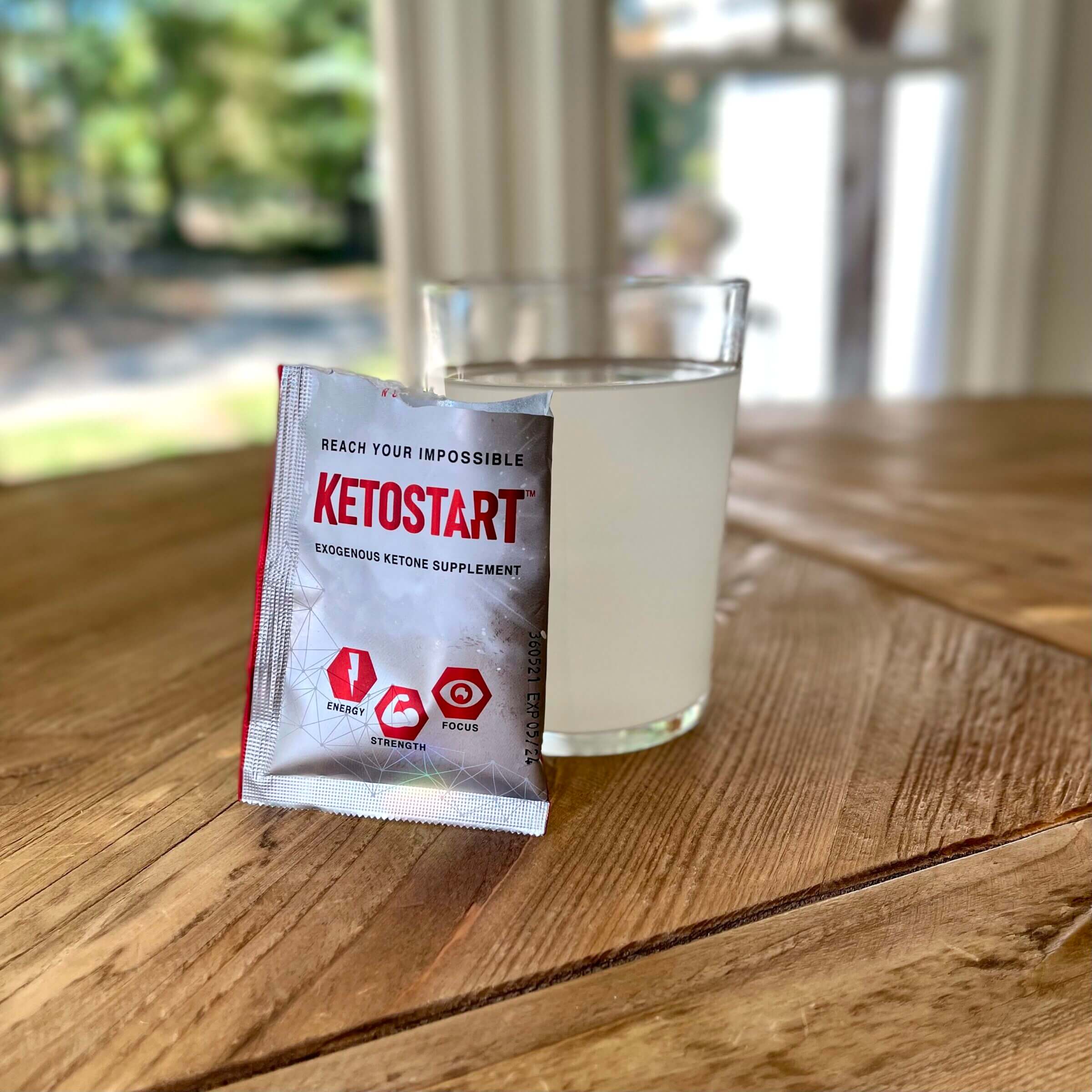
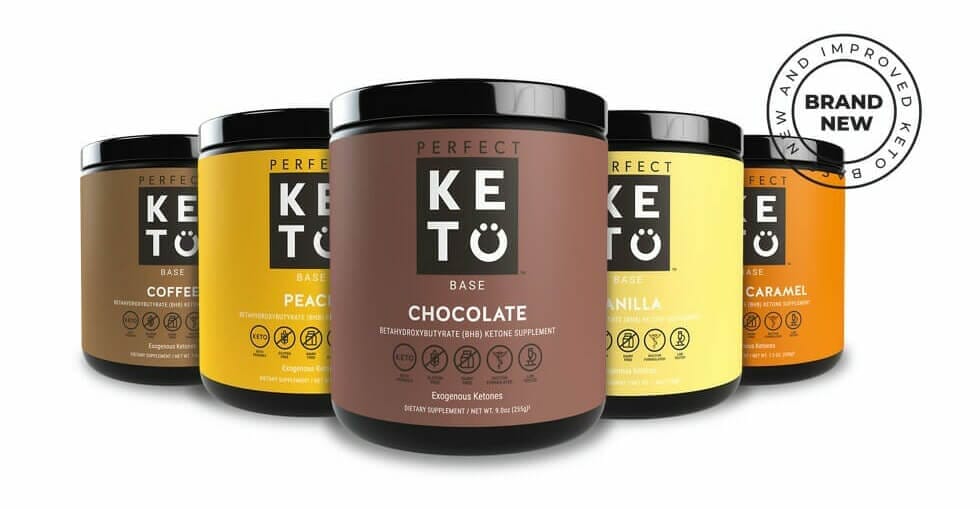
Hi,
Enjoyed your detailed article. Have you used/reviewed Original [email protected]? It is described as a bio-identical D-BHB. Just trying to figure out where this fits in.
Hey Mardi,
Their entire web presence, including the product images, looks unprofessional, and there is zero information about who is behind those products. I’d steer clear.
Cheers,
Michael
Great review!
I used your promo code to order DeltaG Ketone Performance.
Thanks so much, I appreciate your support!
Great review and info. Do you plan on doing a more in depth review on Pruvit in the future?
Thanks, Jared! I haven’t thought about it but will take the suggestion into account!
Did you compared the amount each supplement raised you BioSense ACE ketone level? Say 1 & 2hr after while fasted?
Hey Jesse,
I did but because I tested those products over the course of a few years (the original article is pretty old), I failed to record my findings. I just started keeping track of my levels using Biosense and will update the article with my findings shortly. Spoiler alert, ketone esters are much more effective than salts.
Interesting newer developments on Ketone’s positive affects on capillarization and natural EPO increases in this study. (Note: only taken post-training and pre-sleep, not pre-ride). I feel these studies are much better than the “drink some and ride a time trial” previous studies as to the positive mechanism of the Ketone esters. https://meatmotor.com/nutrition-studies/exogenous-ketone-esters-appear-to-improve-the-number-of-capillaries-and-oxygen-delivery-in-cyclists/ Also, two other studies showed positive results. One showing lessened mental fatigue in ultra runners. An additional one showed higher natural EPO levels and reduced inflammation.
Great info, thanks for sharing!